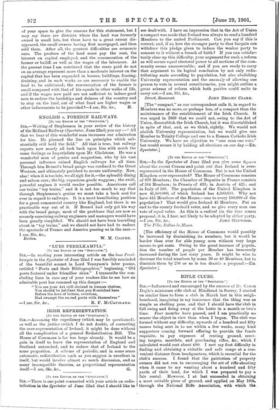(To THE EDITOR OF TEX "SPECTATOR.") Sul,---There is one point
connected with your article on redis- tribution in the Spectator of June 22nd that I should like to
see dealt with. I have an impression that in the Act of Union a compact was made that Ireland was always to send a hundred Members to the united Parliament. Can you say if this is correct, and, if so, how the stronger party to that bargain can withdraw this pledge given to induce the weaker party to consent to it without a breach of faith ? If you can satisfac- torily clear up this difficulty, your argument for such a reform as will secure equal electoral power to all sections of the com- munity seems unanswerable; and if you are ready to carry that argument to its logical conclusion by not only redis- tributing seats according to population, but also abolishing University representation and the anomaly of allowing one person to vote in several constituencies, you might outline a great scheme of reform which both parties could unite to carry out.--I am, Sir, &c.,
[The " compact," as our correspondent calls it, in regard to Members was no more, or perhaps less, of a compact than the maintenance of the establishment of the Irish Church. It was urged in 1869 that we could not, owing to the Act of Union, disestablish the Irish Church, but it was disestablished in spite of that, and, as we think, rightly. We would not abolish University representation, but we would give one Member to Trinity College and one to a Roman Catholic Irish University. We have no objection to "one man one vote," but would secure it by holding all elections on one day.—ED. Spectator.]




















































 Previous page
Previous page